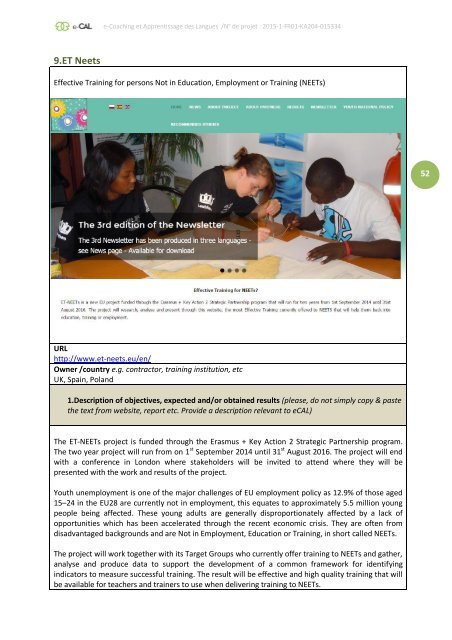e-CAL - e-Coaching et Apprentissage des Langues
The ERASMUS+ project e-CAL presents the result of an analysis of support methods in the case of language learning using web-based Open Educational Resources (OER).
The ERASMUS+ project e-CAL presents the result of an analysis of support methods in the case of language learning using web-based Open Educational Resources (OER).
You also want an ePaper? Increase the reach of your titles
YUMPU automatically turns print PDFs into web optimized ePapers that Google loves.
e-<strong>Coaching</strong> <strong>et</strong> <strong>Apprentissage</strong> <strong>des</strong> <strong>Langues</strong> /N° de proj<strong>et</strong> : 2015-1-FR01-KA204-015334<br />
9.ET Ne<strong>et</strong>s<br />
Effective Training for persons Not in Education, Employment or Training (NEETs)<br />
52<br />
URL<br />
http://www.<strong>et</strong>-ne<strong>et</strong>s.eu/en/<br />
Owner /country e.g. contractor, training institution, <strong>et</strong>c<br />
UK, Spain, Poland<br />
1.Description of objectives, expected and/or obtained results (please, do not simply copy & paste<br />
the text from website, report <strong>et</strong>c. Provide a <strong>des</strong>cription relevant to e<strong>CAL</strong>)<br />
The ET-NEETs project is funded through the Erasmus + Key Action 2 Strategic Partnership program.<br />
The two year project will run from on 1 st September 2014 until 31 st August 2016. The project will end<br />
with a conference in London where stakeholders will be invited to attend where they will be<br />
presented with the work and results of the project.<br />
Youth unemployment is one of the major challenges of EU employment policy as 12.9% of those aged<br />
15–24 in the EU28 are currently not in employment, this equates to approximately 5.5 million young<br />
people being affected. These young adults are generally disproportionately affected by a lack of<br />
opportunities which has been accelerated through the recent economic crisis. They are often from<br />
disadvantaged backgrounds and are Not in Employment, Education or Training, in short called NEETs.<br />
The project will work tog<strong>et</strong>her with its Targ<strong>et</strong> Groups who currently offer training to NEETs and gather,<br />
analyse and produce data to support the development of a common framework for identifying<br />
indicators to measure successful training. The result will be effective and high quality training that will<br />
be available for teachers and trainers to use when delivering training to NEETs.


